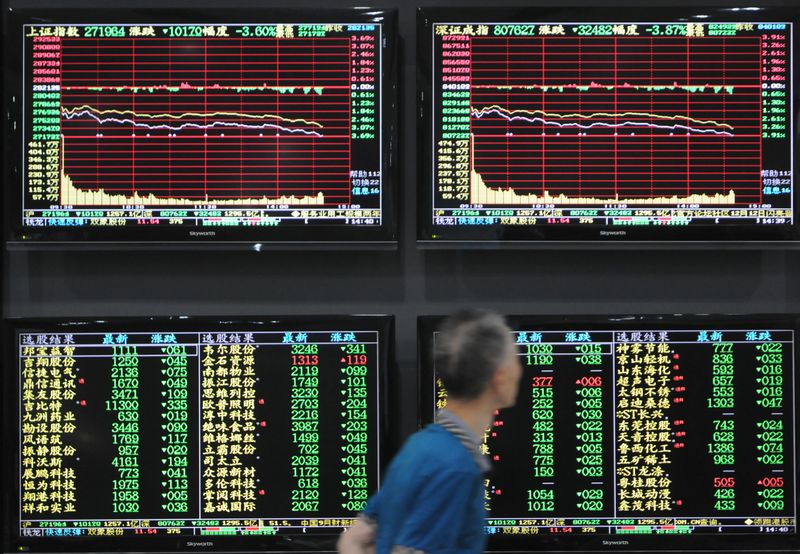Fund managers shun China property bonds on default risks
2022.09.02 12:01

A man walks past screens showing stock information at a brokerage house in Jiujiang, Jiangxi province, China October 8, 2018. REUTERS/Stringer
By Patturaja Murugaboopathy and Gaurav Dogra
(Reuters) – Fund managers are cutting their holdings in Chinese property bonds by half or even more as the sector lurches from crisis to crisis and blows a deep hole in asset managers’ performance.
According to Refinitiv data, 204 out of 242 dollar-denominated bonds issued by Chinese property firms are trading well in distressed territory below 50 cents on the dollar, hammering funds and limiting patience to wait for a recovery.
With angry buyers of unfinished apartments boycotting mortgage payments, new sales and home prices sliding and rescue efforts so far doing little to alleviate developers’ cash crunch, several are opting to cut their losses.
The five largest Asian high-yield funds cut their holdings in Chinese property bonds to 16.4% at the end of June, compared with 27.6% at the end of last year, according to Morningstar.
The BGF Asian High Yield Bond D2 USD fund, for example, cut its exposure in Chinese real estate bonds to 14.7% at the end of June from 27.1% on Dec. 31.
The PIMCO GIS Asia High Yield Institutional USD and Fidelity Asian High Yield A-Acc-EUR also trimmed their holdings to 11.9% and 22% from 22% and 31.7%, respectively.
“As the liquidity crisis exacerbates … many people are now reluctant to hold on to their property bonds,” said Kunal Sawhney, chief executive officer of research firm Kalkine Group.
“Even top institutional investors are trimming their positions in high-yield Chinese dollar bonds as investor confidence begins to wane since the crisis began.”
Patrick Ge, a research analyst at Morningstar, said a combination of lower bond supply and defaulted bonds falling out of indexes also contributed to the cut in Chinese property bond holdings.
“We’ve seen several managers diversifying away from China property and finding opportunities in other Asian high-yield sectors such as Indian renewable companies and Indonesian property space,” he said.
Offshore bonds have fallen 59.4% on average this year and Bank of America (NYSE:BAC) calculated a total of $52 billion in defaults. Mutual funds exposed have taken heavy losses.
The UBS (Lux) BS Asian High Yield $ K-1-acc fund has plummeted 29% this year, while HSBC GIF Asia High Yield Bond XC and Fidelity Asian High Yield A-Acc-EUR have lost about 24% and 21%, respectively.
In efforts to revive the economy, China has cut its benchmark lending rate and officials have repeatedly made promises of further assistance.
However, analysts said the actual financial support to developers is limited, and without a turnaround in market confidence they will not be able to fix cash flow problems.
“We need to see pick up in pre-sales and subsequently a reopening of the capital market to conclude if there is a sector turnaround,” said Agnes Wong, head of APAC credit strategyat BNP Paribas (OTC:BNPQY).
She, however, said it’d be hard for things to get worse. “We see limited downside from here,” she said.








